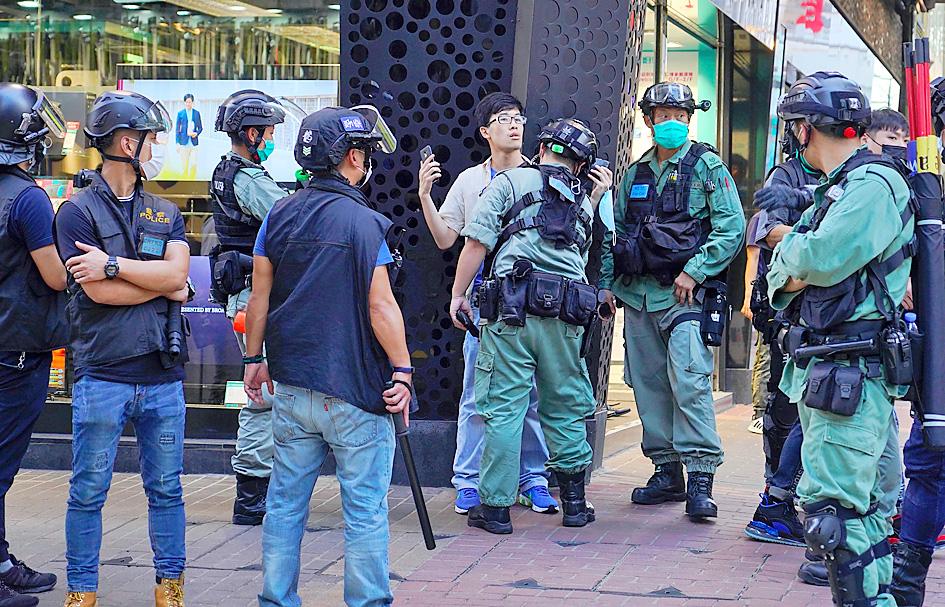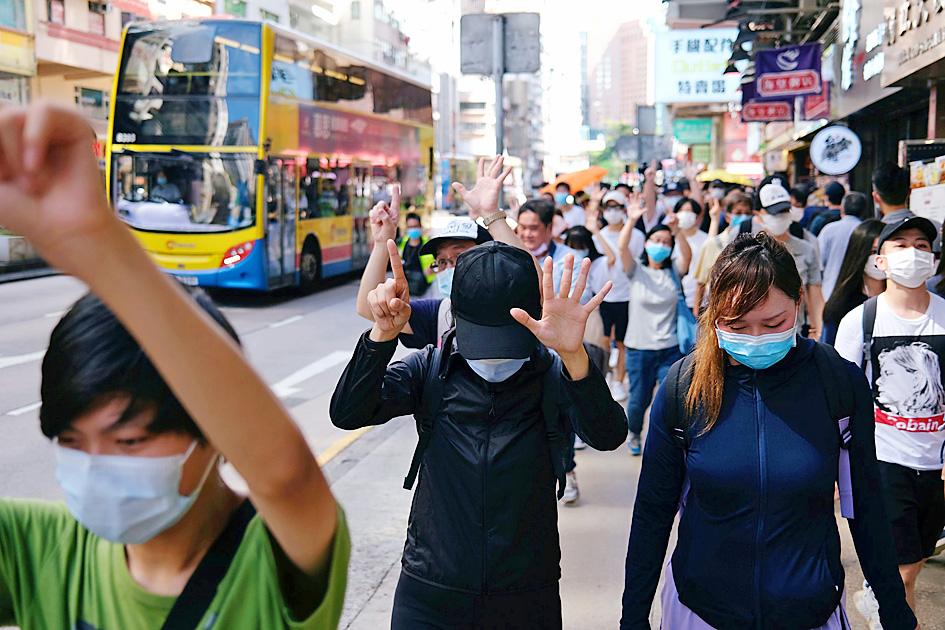The Chinese National People’s Congress (NPC) Standing Committee is to vote on Hong Kong’s security legislation tomorrow morning, the day before the territory’s handover anniversary, Now TV News reported yesterday, signaling Beijing might soon hand down a measure that pro-democracy advocates and business groups say could erode the territory’s unique freedoms.
At a three-day meeting that started yesterday, the Standing Committee discussed the legislation to punish acts of secession, subversion, terrorism and collusion with foreign forces, Radio Television Hong Kong (RTHK) reported earlier, citing Ip Kwok-him (葉國謙), a member of Hong Kong’s Executive Council and one of its non-voting delegates on the committee.
The proposed legislation includes a life sentence for acts of secession and subversion, according to the Now TV report, which cited unidentified people.

Photo: AP
The penalty would be far more severe than what Tam Yiu-chung (譚耀宗), the territory’s only voting delegate in the committee, has suggested.
Prison sentences for the four types of crimes would range from three to 10 years and would be largely in line with Hong Kong’s criminal laws, RTHK said last week, citing Tam.
Albert Ho (何俊仁), former chairman of the territory’s Democratic Party, said the proposed sentence did not surprise him.

Photo: Reuters
“It is a shame that the so-called Hong Kong delegates just let the legislation go through like this,” Ho said. “It is also a shame for China — how can it face the world?”
If the proposed law passes during this Standing Committee session, it could come into effect in time for Wednesday’s anniversary of the territory’s return to Chinese rule in 1997.
Under the legislation, the central government would retain its authority in the territory in three specific circumstances, Now TV said, without providing details.
About 56 percent of residents oppose the legislation, compared with 34 percent who support it, a Reuters/Hong Kong Public Opinion Research Institute poll released on Friday showed.
In related news, hundreds of Hong Kongers yesterday marched silently through the streets in protest against the proposed national security legislation.
Riot police armed with shields were present as the crowd moved from Jordan to Mong Kok in the Kowloon district, as part of a “silent protest” in which they marched with the usual chanting or slogan shouting largely absent.
Scuffles broke out in Mong Kok, prompting police to use pepper spray to subdue parts of the crowd, an eyewitness told Reuters.
“I am here to oppose the national security laws,” said Esther, 25, who was on the streets. “It’s not the last battle, there is a long-term resistance [to the laws].”
Additional reporting by Reuters

SECURITY: As China is ‘reshaping’ Hong Kong’s population, Taiwan must raise the eligibility threshold for applications from Hong Kongers, Chiu Chui-cheng said When Hong Kong and Macau citizens apply for residency in Taiwan, it would be under a new category that includes a “national security observation period,” Mainland Affairs Council (MAC) Minister Chiu Chui-cheng (邱垂正) said yesterday. President William Lai (賴清德) on March 13 announced 17 strategies to counter China’s aggression toward Taiwan, including incorporating national security considerations into the review process for residency applications from Hong Kong and Macau citizens. The situation in Hong Kong is constantly changing, Chiu said to media yesterday on the sidelines of the Taipei Technology Run hosted by the Taipei Neihu Technology Park Development Association. With

CARROT AND STICK: While unrelenting in its military threats, China attracted nearly 40,000 Taiwanese to over 400 business events last year Nearly 40,000 Taiwanese last year joined industry events in China, such as conferences and trade fairs, supported by the Chinese government, a study showed yesterday, as Beijing ramps up a charm offensive toward Taipei alongside military pressure. China has long taken a carrot-and-stick approach to Taiwan, threatening it with the prospect of military action while reaching out to those it believes are amenable to Beijing’s point of view. Taiwanese security officials are wary of what they see as Beijing’s influence campaigns to sway public opinion after Taipei and Beijing gradually resumed travel links halted by the COVID-19 pandemic, but the scale of

A US Marine Corps regiment equipped with Naval Strike Missiles (NSM) is set to participate in the upcoming Balikatan 25 exercise in the Luzon Strait, marking the system’s first-ever deployment in the Philippines. US and Philippine officials have separately confirmed that the Navy Marine Expeditionary Ship Interdiction System (NMESIS) — the mobile launch platform for the Naval Strike Missile — would take part in the joint exercise. The missiles are being deployed to “a strategic first island chain chokepoint” in the waters between Taiwan proper and the Philippines, US-based Naval News reported. “The Luzon Strait and Bashi Channel represent a critical access

Pope Francis is be laid to rest on Saturday after lying in state for three days in St Peter’s Basilica, where the faithful are expected to flock to pay their respects to history’s first Latin American pontiff. The cardinals met yesterday in the Vatican’s synod hall to chart the next steps before a conclave begins to choose Francis’ successor, as condolences poured in from around the world. According to current norms, the conclave must begin between May 5 and 10. The cardinals set the funeral for Saturday at 10am in St Peter’s Square, to be celebrated by the dean of the College